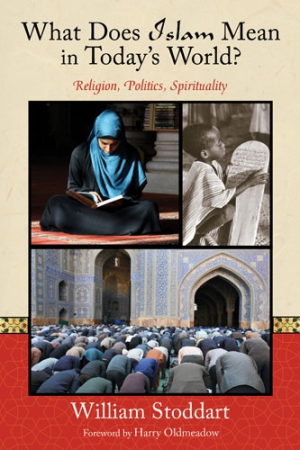What Does Islam Mean in Today's World?
Religion, Politics and Spirituality
What Does Islam Mean in Today’s World? makes use of Islam as a vehicle for exploring the state of religion in modernity. Its primary aim is to redeem Islam as it exists in the public’s mind, where the erosion of its true nature has been fed by misinformation. In the process of affecting this reeducation, the book becomes a searing indictment of the dominant impulses of the post-Enlightenment world. “Religion [has], in the present age, become subject to massive betrayal and perversion” claims Dr. William Stoddart, former assistant editor of Studies in Comparative Religion.
A good portion of the work is devoted to apologetics, and so Stoddart explores both what religions ought to be—systems driven by a devotion to truth, beauty, and salvation—and how contemporary incarnations of religions have deviated from this track. The mystics of Islam are held up as its “true and authentic voices”; Stoddart laments that, nonetheless, the public tends to conflate Islamic terrorists with Islam as a whole. Against the resultant misconceptions, he contends that Islam has been historically tolerant of other religions, respectful of women and their sacred roles, and reliably non-violent. Islam’s history is succinctly and respectfully explored in defense of these claims.
An equal portion of the book is spent investigating the contemporary hostilities toward spirituality which have enabled popular degradation of Islam. Against the corrosive “spirit of the times,” Stoddart champions the truth of “perennial religion,” expressions of which he views as holdouts against the seductive and false idols of the modern age.
Among those who cherish traditional religion as humanity’s greatest hope, What Does Islam Mean in Today’s World? will find a ready audience. But much in its pages will also be anathema to those it criticizes—among them feminists, agnostics, atheists, individualists, and those on the far right. Indeed, few groups escape Stoddart’s sights unscathed. Stoddart is open about his aversion to “political correctness,” and this is readily evinced by his dismissal of characters as diverse as Darwin, Teilhard de Chardin, and Freud as “nefarious,” as well as by his dogged insistence that Vatican II destroyed the Catholic Church. The persuasive power of his pages will be limited for those unable to sympathize with these strong positions, a loss which comes to seem unfortunate, if not unnecessary. An eloquent and erudite examination of religious currents and the cultural impulses which affect them.
Reviewed by
Michelle Anne Schingler
Disclosure: This article is not an endorsement, but a review. The publisher of this book provided free copies of the book and paid a small fee to have their book reviewed by a professional reviewer. Foreword Reviews and Clarion Reviews make no guarantee that the publisher will receive a positive review. Foreword Magazine, Inc. is disclosing this in accordance with the Federal Trade Commission’s 16 CFR, Part 255.

